Together As One: It Takes a Church
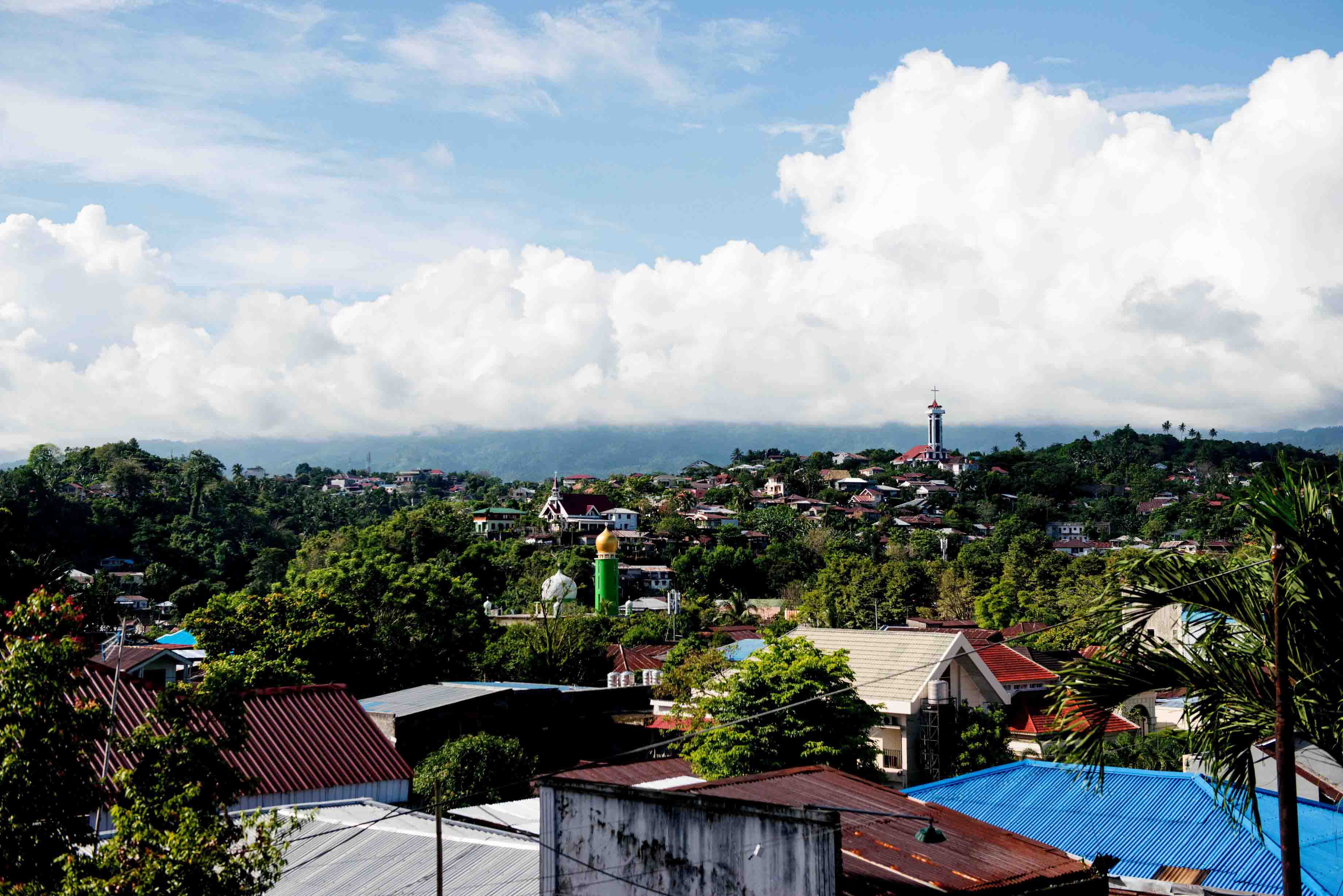
More than 600 miles off the coast of Papua, nestled in the ring of volcanic islands encircling the Banda Sea, Ambon Island is waking up.
The sun creeps over the island’s lush mountains, bathing a small bay in soft light. Seasoned, wooden fishing boats stand like watchmen, glistening from their posts dotting the bay. And all at once, the glassy water is stirred to life as the first fishermen of the day effortlessly wade out to their dinghies.
On the nearest bank, a flurry of activity emerges from the thick, tropical trees and the sound of laughter and energetic chatter is amplified over the water. A stream of women and girls spills out onto the beach, crowding at the water’s edge with buckets and sleepy-eyed babies in hand, ready to receive the fishermen’s haul.
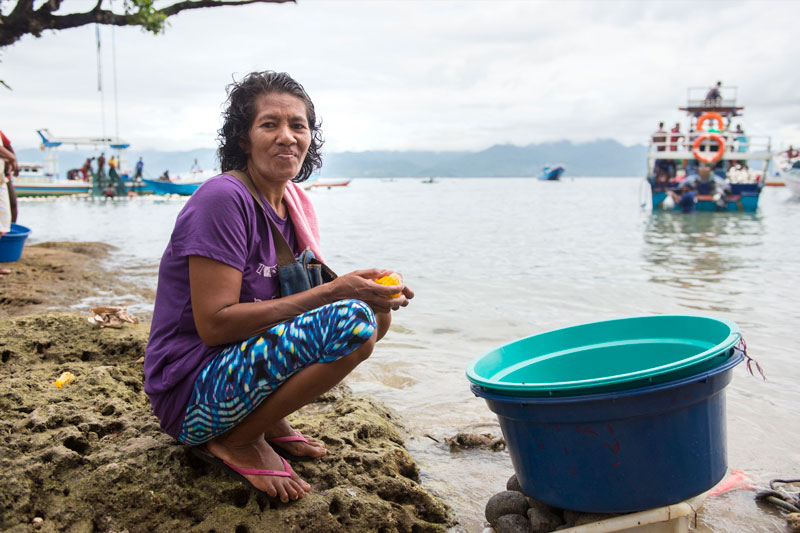
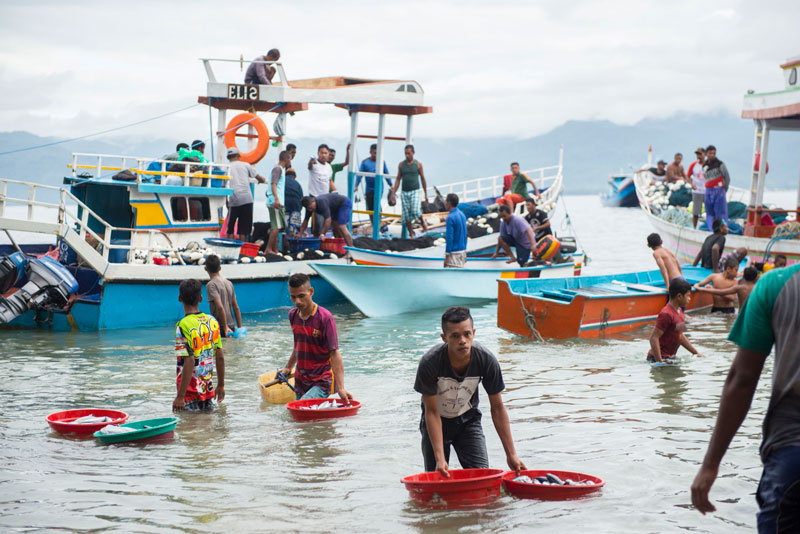
In this fishing town, it’s all hands on deck for the familiar morning ritual. Each member of the community assembled at the bay this morning has a role to play, and together they settle into their rhythm; fishermen glide through the water back and forth from shore to ship, and an assembly line extends out waist-high into the bay until the fish make their way to the women onshore to be sorted and cleaned.
On the hill overlooking the commotion stands Ampi Huwae, a young Ambonese Malay speaker, chatting with some of his neighbors. This is Ampi’s village. Though Ampi is not a fisherman, he has spent the last four years contributing to his community on a different team — as the newest member of the Ambonese Malay Bible translation project.
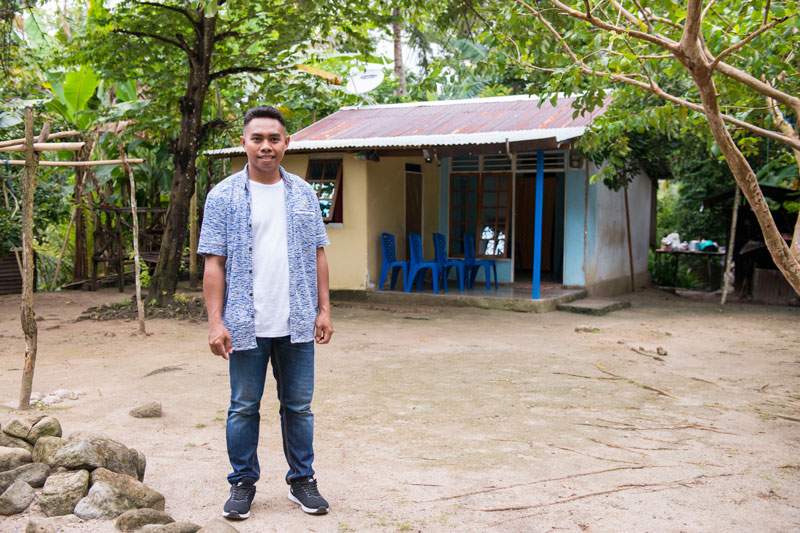
Together as a Team
For over 13 years this multinational team has been working to translate the New Testament into the Ambonese language.
Though the Ambonese have had access to the Bible in Indonesian for many years, its message hasn’t stuck. They might understand it, but it doesn’t click in the same way as their primary language.
“It’s important to have the Ambonese translation for those who don’t have a high education, so they can clearly understand what is in God’s Word, and what his truth is for them and their lives,” Ampi said. “When they read it everybody says, ‘Oh yes, there is a good use for having this. We can understand God’s Word.’”
The team approached Ampi four years ago to help them test one of their translated passages and make sure it was accurate and sounded natural. They quickly discovered Ampi had the skills for translation and asked him to join the team.
“The Ambonese Malay team, to me, … is just like my family at home. We’re always sharing with one another, and we feel like a family,” Ampi said. “We enjoy joking with one another, having a good time with each other. Myself, I like to make the team laugh so that we’re more energized to keep working and keep going.”
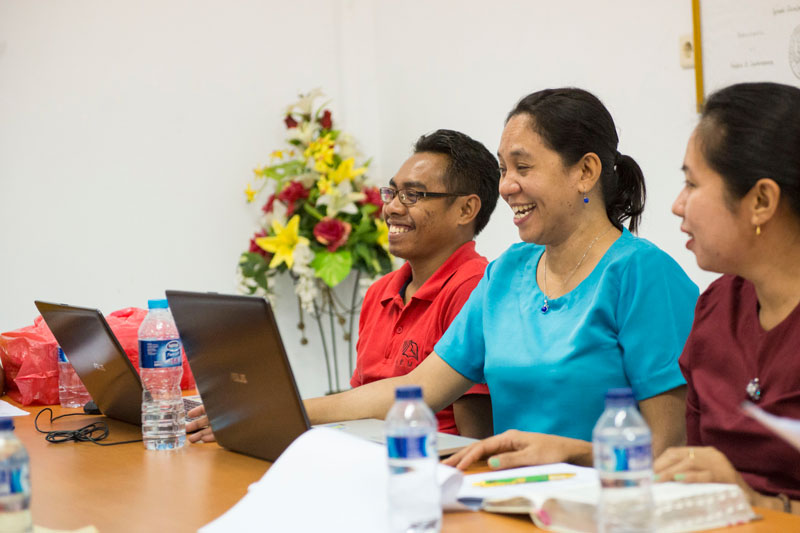
Stephanie Richards is a translation facilitator with Wycliffe USA who has served as the team leader for 11 years. She has seen the team grow over time to include members who each meet a specific need for the translation work. Much like the fishing village, they have developed a rhythm of their own.
“Steve is our creative genius. Ibu Dean is the go-to person when it comes to cultural questions. Then there’s Ocha; she’s been with us for 13 years and has done a lot of the drafting. Ampi is our newest team member. We’ve found that he’s incredibly competent, a fast learner and humble,” Stephanie said. “I love the people I work with. We’re in the trenches together through the hard times and the wonderful times.”
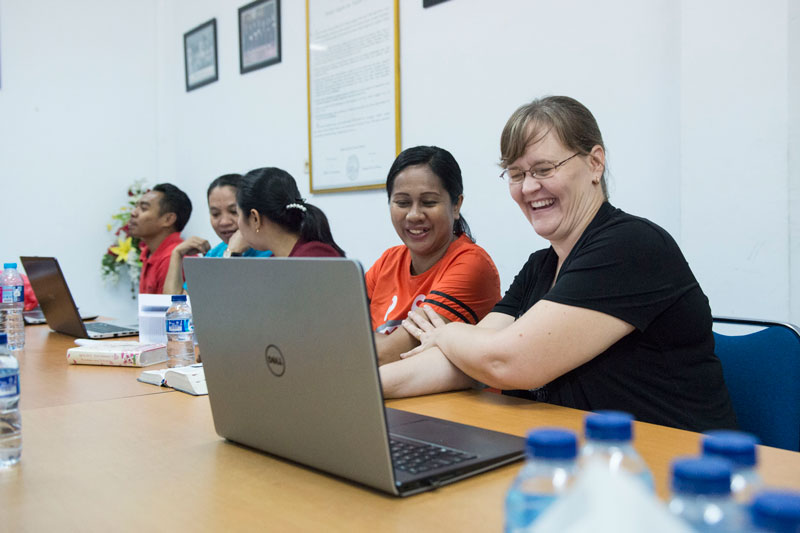
The More the Merrier
Just like a good team that has different crucial members, a good Bible translation in this culture needs several key players. To truly be accepted, the translation team can’t function autonomously; it’s part of a larger body that includes the local community around it.
Like many cultures where Wycliffe USA works, Indonesia is a collectivist culture; whether it’s religion, relationships or a livelihood like fishing, the focus is on the group and the greater good, not on the individual.
People study Scripture almost exclusively as a group, either at Sunday services or as a family. It would be rare to see an Ambonese retreating away for a “quiet time alone with God” as we often do in our culture.
Jon Richards, Stephanie’s husband and Wycliffe USA’s eastern Indonesia partnership facilitator, has seen this cultural norm play out across Indonesia. Like the early believers in Acts, “people make decisions as a group,” he said. “When it comes to hearing the gospel and communities being transformed, it’s usually not just one person, but a whole community can experience transformation together.”
So what better way for a translation team to help a community experience the Scriptures together than to involve them in the process? Once a story or passage is drafted, the team invites people from the neighborhood to help them check their work.
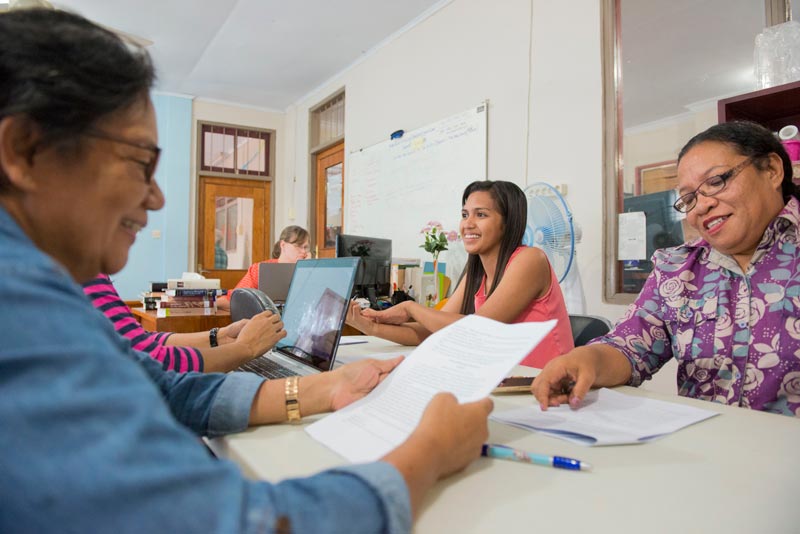
“Part of the process we go through after the initial draft is … to do a check with them, just making sure everything is clear and natural. We’ll go through verse-by-verse, asking comprehension questions,” said Carrie, one of the team’s translation coordinators.
“The first time we did a test with the community, there was a certain man who participated,” recalled Ocha Hitalessy. “We asked him, ‘Sir, why are you crying? Have you not known about Jesus Christ before now?’ He said, ‘I’ve known about Jesus dying on the cross my whole life. But now for the first time, in my own language, I understand why he died for me.’”
As community members experience the Scriptures in their language through checking sessions, they share the stories and passages with their families and neighbors. News of the translated Scriptures and the principles they teach begins to spread.
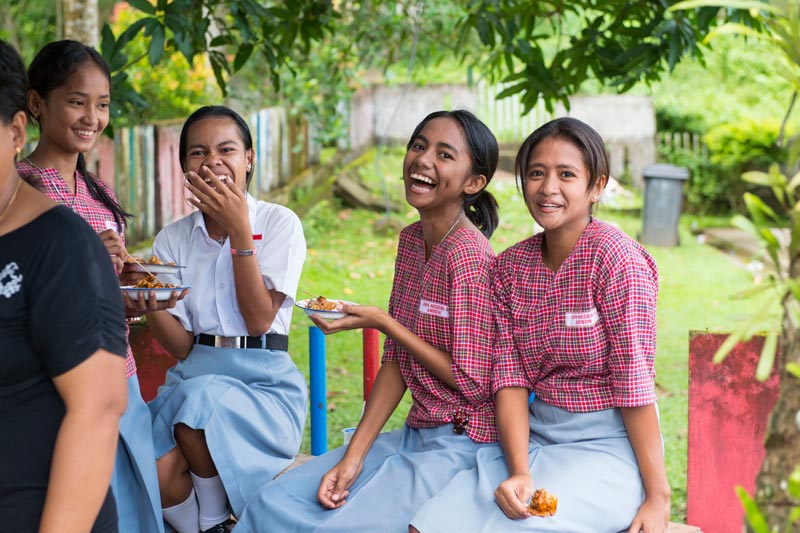
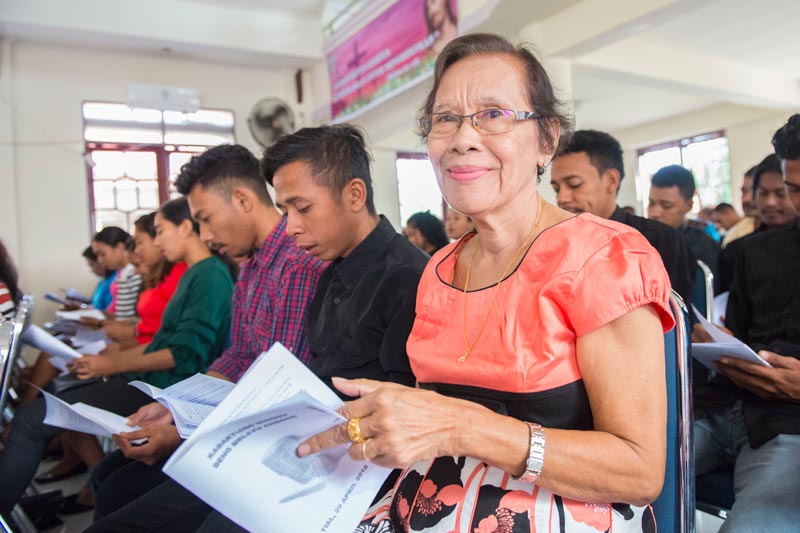
But, for the most effective engagement of a new translation, there’s one more important teammate who needs to be on the roster: the local church.
Reaching the Pews
The translation team operates under the umbrella of the Protestant Church of Maluku, the local church (denomination) with congregations in Ambon and the surrounding province. A review team of pastors checks all of the work they’ve done. Pastors typically preach using Indonesian, and in the past they’d didn’t have much vision for Bible translation or feel a need to learn the minority languages that the Scriptures were being translated into.
“Ambonese Malay has been the bridge that has allowed the church leadership to see what it is that we do, how Bible translation is done and that it can be trusted,” Stephanie said. “They know that we’ll be faithful to the text.
“We work very hard when we’re translating to make sure that it’s accurate with God’s Word,” Ampi said, “and that we don’t change any of the meaning in the original text so that when people read it they will say, ‘Oh yes, this is accurate. This is God’s Word.’”
One of Stephanie’s greatest joys was when the church asked her team to translate their liturgy into Ambonese: “That’s key here. Christianity came to this region four centuries ago, so it’s long-rooted in tradition. To worship in Ambon, you need liturgy, songs and Scripture. If we didn’t provide all three in some form, they wouldn’t use the [translated] Scripture in church. We take every opportunity we can to meet felt needs of local churches and other organizations.

“This isn’t Wycliffe’s translation or America’s translation. This is the translation of the Ambonese people. We’re here to serve them and to meet their needs, to train and equip the translators so they can continue this work themselves,” Stephanie said.
“They say it’s a good idea to work yourself out of a job; I think I’ve almost accomplished that. The team members, they can now do everything I do, and that’s where we want to be.”
Today, that partnership is reaping tremendous rewards. The team has finished drafting the New Testament and expects to hold a dedication in the next two years. But more importantly, the church and community are embracing the translated Scriptures with open arms.
“One of the ways we know Scripture is reaching the people sitting in the pews is because the pastors come and tell us, ‘I preached in Ambonese Malay, and everybody is telling me to do it again!’” Stephanie said. “That’s something we haven’t seen in years past.

“If there’s a foreign organization giving this church a Bible in their language, there’s no telling what will be done with it. They might just put it aside,” she said. “Because this church is so involved in this New Testament translation … we have some assurance that they’re going to be using it in the future.”
Ampi is thrilled to know that he can bring the Ambonese Malay translation back to his family and his fishing village, and that they’ll be able to use it: “My family would understand the results of our work very well. It makes me very happy to be part of this team.
“It brings me a lot of joy thinking about the results of this translation work, knowing generations ahead will be able to read the Scriptures.”
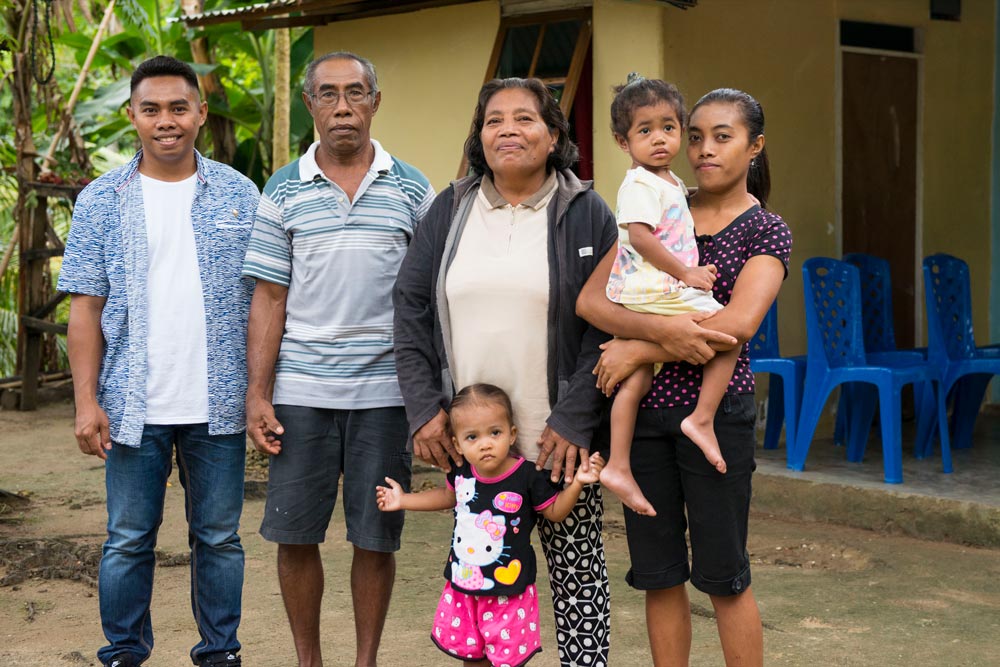
You can help support the transformative work of Bible translation in places like Ambon Island.



